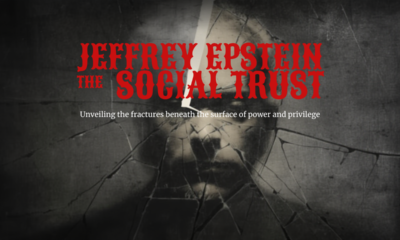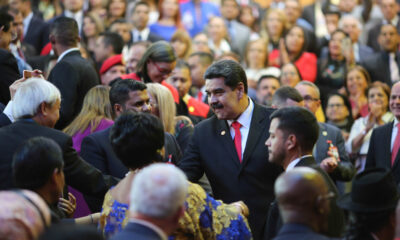Executive
‘Bond Market Death Spiral’ Vance Feared Would Be ‘Devastating’ to Trump
When President Trump first announced his tariffs, people talked up a bond market death spiral, which, thus far, hasn’t happened.

While President Trump projected confidence, the White House was haunted during the latest round of tariff turmoil by the possibility of a “bond market death spiral.” Having worked as a venture capitalist before entering politics, Vice President J.D. Vance had previously regarded the phenomenon as one of his greatest concerns.
The bond market did sell off
A plunging stock market took center stage, but it was another sell-off that alarmed Wall Street.
Ahead of the tariff deluge, investors offloaded government securities, sending the yield on Treasury bonds ever higher. Amidst the trade uncertainty, the 10-year Treasury bond climbed to 4.51% while the 30-year hit 5% – the highest mark since November 2023. Both consumer and federal debt, as a result, became more expensive to hold. Higher yields eventually mean higher borrowing costs for everything from auto loans and mortgages to maintaining the federal debt itself.
Trump, a real-estate mogul before politics, knows the effect of rising bond markets on the ability of banks to lend. Trump, the politician, also knows how fears of a credit crisis can bring low a world leader.
Liz Truss became the shortest-serving prime minister in British history when her proposal to pay for tax cuts with government borrowing spooked that country’s bond markets. She resigned in 2022 as a result. Across the Atlantic, an Ohio Republican was watching closely.
“Interest rates shot through the roof, and it took down her government in a matter of days,” Vance said of Truss during an interview with Tucker Carlson last September. There are differences between the politicians and political systems, he noted of Trump and Truss, “but it would be devastating to the president if you had this bond market death spiral.”
Trump plays it cool
Vance speculated that the turmoil in the United Kingdom may have been manufactured. The next administration, the then vice-presidential nominee said, would be on the lookout for a similar dynamic: “That is one of the things we’re going to have to fight against when we win.”
“I talk to the president about this a lot,” Vance told Carlson. It was one of the reasons, he said, why Trump had to find the right person to lead Treasury, a nominee who “can manage this country through a real time of crisis.”
Fast forward to April. As talk of recession became more common in this country, Trump played it cool and told the country to do as much. “Be cool,” he said yesterday as stock markets slipped and, perhaps more concerning to his VP, the bond market yields climbed. He knew what he was doing, Trump told Republican lawmakers at a fundraiser the night before, and Wednesday morning, he told the country via Truth Social post that “everything is going to work out well.”
Relief came shortly after, at 1:18 p.m. exactly, when Trump announced that he was pausing his new tariff schedule for 90 days to allow for negotiations with trading partners. It was a welcome respite. The stock market had caught the attention of the nation, including retail investors and retirees nervously checking their 401(k)s. “People were jumping a little bit out of line,” Trump said. “They were getting yippy.” Treasury yields, meanwhile, worried economists and academics.
Cool heads prevail
Former U.S. Treasury Secretary Lawrence H. Summers, a frequent critic of the Biden administration, warned early Wednesday morning that a serious financial crisis may be on the horizon. “Long-term interest rates are gapping up, even as the stock market moves sharply downwards,” he wrote. “This highly unusual pattern suggests a generalized aversion to US assets in global financial markets.” The United States, the strongest economy in the world, Summers said, was being treated by global investors no differently than “a problematic emerging market.”
This did not escape Trump’s notice. He said of the bond markets, which started to level out, “I saw last night where people were getting a little queasy.”
Projecting calm himself, Treasury Secretary Scott Bessent had told Maria Bartiromo of Fox Business that morning that there was “nothing systemic about” the bond market sell-off. After the president announced the 90-day pause on tariffs, Bessent dismissed the idea that the administration had changed course because of bond yield alarm bells and told reporters that smoothing markets were the result of new “certainty.” Karoline Leavitt, standing by his side, said it was all part of the plan. Quipped the White House press secretary, “Many of you in the media clearly missed ‘The Art of the Deal.’”
Vance made clear in his interview with Carlson where he expected the threat to originate. He worried last September about foreign actors and political opponents sending bond yields higher in an effort to sink the administration, not any action by the president himself.
Is the bond market subject to manipulation?
“Do the bond markets, do the international investors – the people who are getting rich off of globalization, the people who have gotten rich from shipping our manufacturing base to China, the people who have gotten rich from a lot of wars – do they try to take down the Trump presidency,” he asked, “by spiking bond rates?”
The 10-year yield on Treasury bonds has dropped but still remains 0.37 percentage points above where it started the week. By the time the Cabinet met for a meeting at the White House Thursday, Bessent was heralding stabilization. Foreign investors had shown up for the bond auction, the secretary reported to the president, more evidence “that the U.S. is still the best place to invest.”
The bond market death spiral, which the VP feared, has yet to materialize.
This article was originally published by RealClearPolitics and made available via RealClearWire.
Philip Wegmann is White House Correspondent for Real Clear Politics. He previously wrote for The Washington Examiner and has done investigative reporting on congressional corruption and institutional malfeasance.
-

 Civilization3 days ago
Civilization3 days agoTariffs, the Supreme Court, and the Andrew Jackson Gambit
-

 Civilization3 days ago
Civilization3 days agoWhy Europe’s Institutional Status Quo is Now a Security Risk
-

 Civilization4 days ago
Civilization4 days agoDeporting Censorship: US Targets UK Government Ally Over Free Speech
-

 Executive4 days ago
Executive4 days agoWaste of the Day: Wire Fraud, Conflicts of Interest in Connecticut
-

 Civilization4 days ago
Civilization4 days agoEpstein and the destruction of trust
-

 Civilization2 days ago
Civilization2 days agoTrump Lashes Out at Supreme Court as Under ‘Foreign Influence’
-

 Education5 days ago
Education5 days agoWaste of the Day: Throwback Thursday – The Story of Robosquirrel
-

 Civilization1 day ago
Civilization1 day agoMaduro’s Capture: U.S. Foreign Policy in Latin America








